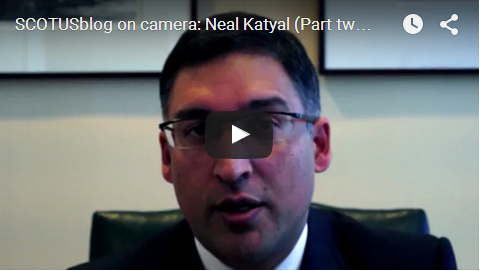SCOTUSblog on camera: Neal Katyal (Part two)
“Appellate advocacy, particularly at the Supreme Court, is really intimate. I mean, you’re just a few feet away from the Chief Justice. You know, if you’re sweating, they see you. And, it’s a conversation. And, you know, if you’re looking down at your legal pad the whole time, you’re not going to have that conversation.”
Neal Katyal is a partner at Hogan Lovells, where he co-directs that firms appellate practice a practice formerly run by now-Chief Justice John G. Roberts, Jr. Katyal has argued twenty-four cases before the Court, including his first case, Hamdan v. Rumsfeld.
Mr Katyal is the Paul and Patricia Saunders Professor of National Security Law at the Georgetown University Law Center, where he has taught constitutional law for fifteen years. He served as Acting Solicitor General in the Obama administration and as the National Security Advisor and a Special Assistant to the Deputy Attorney General during the Clinton administration.
Mr Katyal is a graduate of Yale Law School and Dartmouth College. He clerked for Justice Stephen G. Breyer and Judge Guido Calabresi of the U.S. Court of Appeals for the Second Circuit.
In this five-part interview, Mr Katyal discusses his background, including how discovering high school debate changed his life, working in national security and picking Hamdan v. Rumsfeld as his first Supreme Court case; the details of oral argument before the Supreme Court; understanding the importance of technical knowledge in understanding law, legal arguments and results; serving as Acting Solicitor General of the United States and how the Solicitor General’s office compares to private practice; and teaching law, clerking for Justice Stephen G. Breyer and Judge Guido Calabresi, and what to think about cameras in the Court.
Part two: The conversationalist
“Appellate advocacy, particularly at the Supreme Court, is really intimate. I mean, you’re just a few feet away from the Chief Justice. You know, if you’re sweating, they see you. And, it’s a conversation. And, you know, if you’re looking down at your legal pad the whole time, you’re not going to have that conversation.”
Dissecting oral argument: Filing Hamdan v. Rumsfeld (and trying to give it away before it reached the Supreme Court); how an acting coach helped a new Supreme Court advocate; understanding the value of oral argument; the importance of moot argument, the brief and “the binder” that has been consulted only once; believing every Justice is always in play; answering questions from all directions, advocating for one’s client, serving the Court — all in the form of a conversation; and knowing if you have won or lost.
Posted in Everything Else

